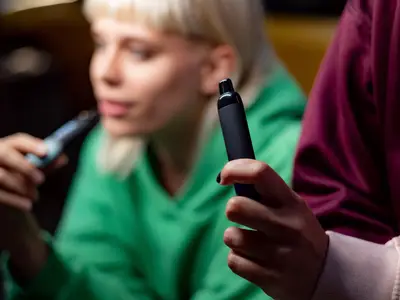Investigating the health effects, marketing practices, and policy impact of e-cigarettes and other vapor products
Electronic nicotine delivery systems (ENDS)—including e-cigarettes, e-pens, e-pipes, and e-hookah—arrived in the marketplace in the mid-2000s, creating both excitement and uncertainty.
Initially, ENDS products were hailed as a safer alternative for cigarette smokers, but their use has skyrocketed among people who were not previously smokers. In 2019, 56% of ENDS users aged 18 or older had never smoked cigarettes, according to the Truth Initiative.
In addition, the number of youth and adolescent ENDS users has been steadily increasing since 2013. The 2022 National Youth Tobacco Survey reported that 2.6 million middle and high school students in the United States used ENDS products in the past 30 days, including 3.3% of middle schoolers and 14.1% of high schoolers. The marketing of these products has become more sophisticated and is reaching new audiences—especially youth and adolescents—through social media. In a study released in 2019, researchers at RTI International found that more than 80% of the Twitter followers of JUUL, a popular e-cigarette brand, were users between the ages of 13 and 20.
As ENDS products continue to be used more frequently, scientific study is essential on their safety compared to cigarettes, how much nicotine and other ingredients they deliver, and what new risks they might introduce to users. Researchers at RTI are at the forefront of this critical research and understand that many unanswered questions remain. RTI’s experts have wide-ranging expertise across a variety of disciplines—including public health and policy, pharmacology and toxicology, aerosol technology, and health communications—and are investigating vital ENDS-related topics, such as emissions, secondhand smoke exposure, product labeling, and point-of-sale policies.
Understanding the effects of ENDS products will require ongoing research that can rapidly respond to these challenges. RTI is leading the scientific effort to support consumers, health agencies, and other stakeholders in making informed decisions about ENDS products.
Related Projects
Analysis of Secondhand E-Cigarette Emissions
Read More about Analysis of Secondhand E-Cigarette Emissions
















